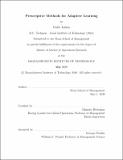| dc.contributor.advisor | Dimitris Bertsimas. | en_US |
| dc.contributor.author | Lukin, Galit. | en_US |
| dc.contributor.other | Massachusetts Institute of Technology. Operations Research Center. | en_US |
| dc.date.accessioned | 2020-09-15T21:50:37Z | |
| dc.date.available | 2020-09-15T21:50:37Z | |
| dc.date.copyright | 2020 | en_US |
| dc.date.issued | 2020 | en_US |
| dc.identifier.uri | https://hdl.handle.net/1721.1/127293 | |
| dc.description | Thesis: S.M., Massachusetts Institute of Technology, Sloan School of Management, Operations Research Center, May, 2020 | en_US |
| dc.description | Cataloged from PDF version of thesis. | en_US |
| dc.description | Includes bibliographical references (pages 53-54). | en_US |
| dc.description.abstract | It is undeniable that recent world events and globalization have transformed online learning into one of the main channels for education. Online learning has become a necessity, not a luxury. Universities, schools, and pre-schools have transformed into the online learning space holding classes of hundreds of students concurrently. However, online learning has yet to reach its full potential. Although educators understand the benefits and effectiveness of online learning platforms, the lack of engagement and evaluation are clear. None the less, these challenges can be solved through machine learning. In this thesis, we present novel, interpretable prescriptive methods to the online learning setting. We apply these techniques to adaptive learning and test them in real online course settings. We show that using an interpretable, optimal tree-based approach improves both the engagement and the learning rates of the learners. We present PLOpt, a full-stack web app that leverages machine learning models and learner, content knowledge to create assignments that best suit each individual learner. We describe the models, how they were tested, and their evaluation. We demonstrate that by using PLOpt, learners achieved higher engagement and proficiency levels. In addition, we show how PLOpt created assignments that matched the correct difficulty level of the learners so that the learner could remain engaged with challenging questions, yet not frustrated by questions too difficult to answer. Altogether, this work demonstrates that applying interpretable machine learning to online learning builds personalized learning platforms and solves the challenges raised in today's online learning world. | en_US |
| dc.description.statementofresponsibility | by Galit Lukin. | en_US |
| dc.format.extent | 54 pages | en_US |
| dc.language.iso | eng | en_US |
| dc.publisher | Massachusetts Institute of Technology | en_US |
| dc.rights | MIT theses may be protected by copyright. Please reuse MIT thesis content according to the MIT Libraries Permissions Policy, which is available through the URL provided. | en_US |
| dc.rights.uri | http://dspace.mit.edu/handle/1721.1/7582 | en_US |
| dc.subject | Operations Research Center. | en_US |
| dc.title | Prescriptive methods for adaptive learning | en_US |
| dc.type | Thesis | en_US |
| dc.description.degree | S.M. | en_US |
| dc.contributor.department | Massachusetts Institute of Technology. Operations Research Center | en_US |
| dc.contributor.department | Sloan School of Management | |
| dc.identifier.oclc | 1191901045 | en_US |
| dc.description.collection | S.M. Massachusetts Institute of Technology, Sloan School of Management, Operations Research Center | en_US |
| dspace.imported | 2020-09-15T21:50:37Z | en_US |
| mit.thesis.degree | Master | en_US |
| mit.thesis.department | Sloan | en_US |
| mit.thesis.department | OperRes | en_US |
